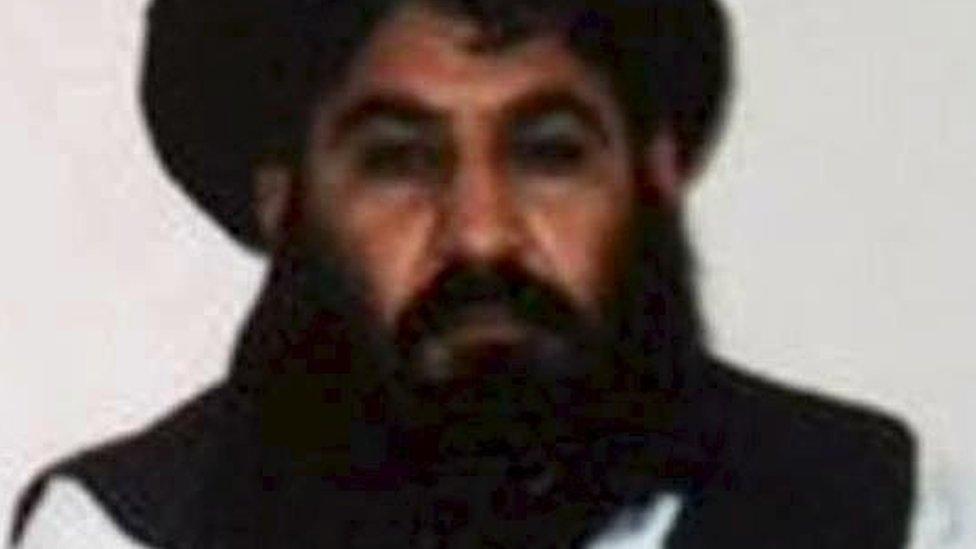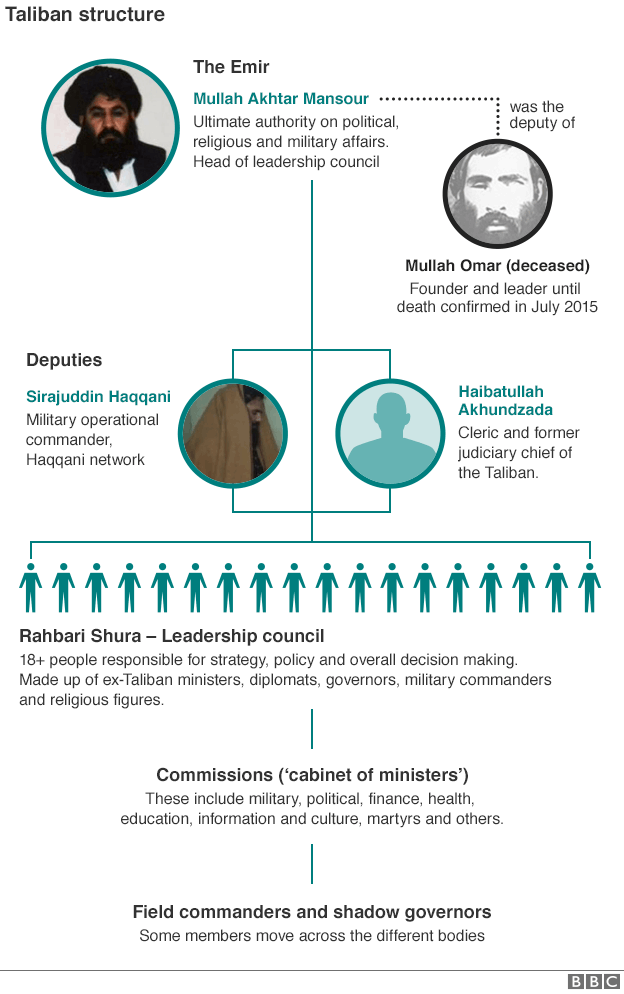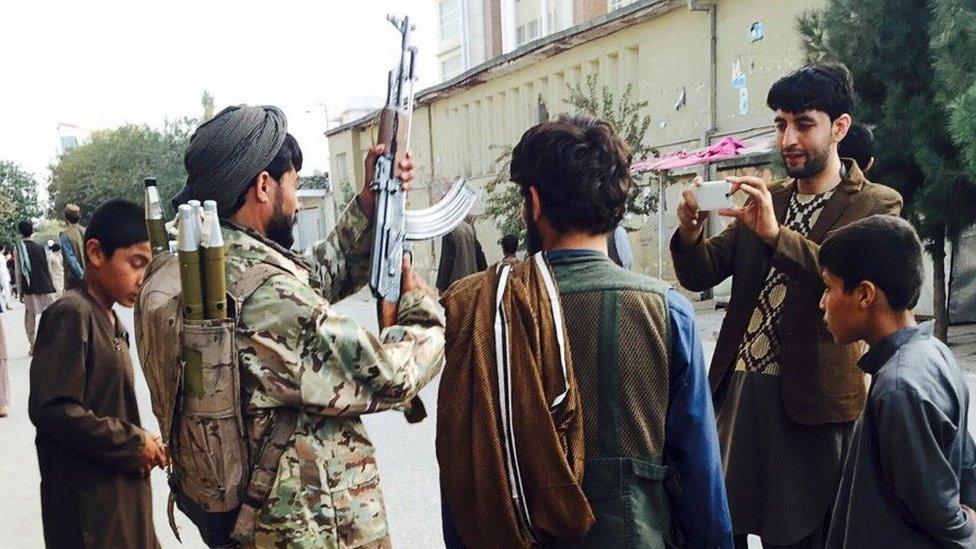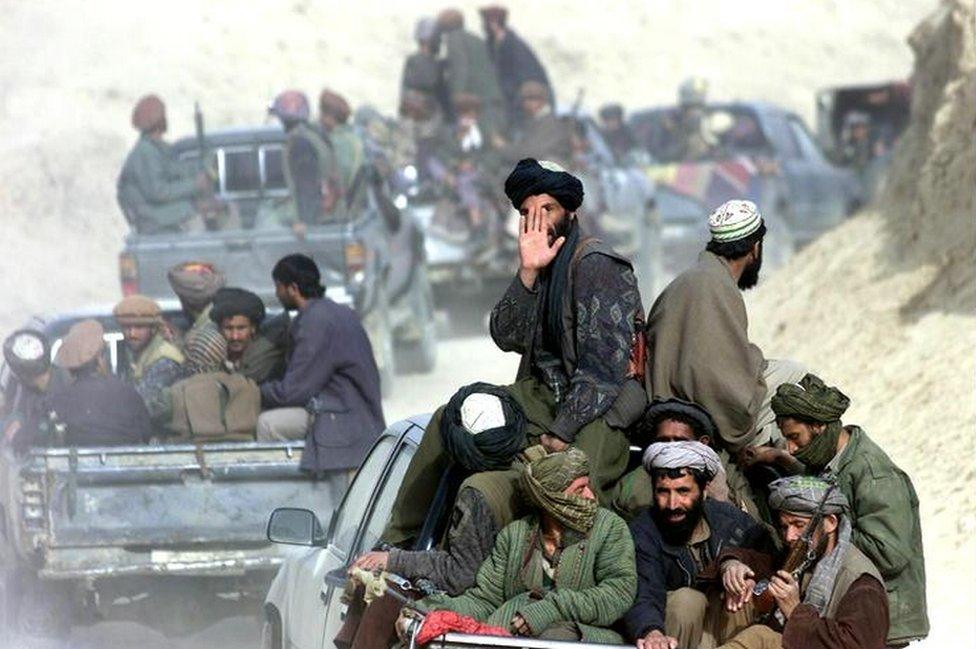Profile: Taliban leader Mullah Akhtar Mansour
- Published

Mullah Akhtar Mansour quickly climbed through the Taliban hierarchy
Elevation to the top leadership of one of the world's deadliest militant movements does not come with assurances of longevity, but Mullah Akhtar Mohammad Mansour's short tenure as Taliban leader has to be some sort of a record.
He came from the influential Ishaqzai clan of the Durrani tribe of Pashtuns in Kandahar province, the political and cultural seat of Pashtun power in Afghanistan.
Before assuming the leadership of the Taliban, he functioned as the acting head of the movement on behalf of Mullah Mohammad Omar, its founder and spiritual head.
In this capacity, he is understood to have authorised the release of periodic statements by Mullah Omar on the official Taliban website, even after Mullah Omar had been dead for a long time.
This created controversy within the higher echelons of the movement, and there were allegations that he might have conspired with some other tribal allies or elements in Pakistan to assassinate Mullah Omar.
Many of his detractors accused him of being firmly in the hands of the Pakistani intelligence apparatus, which they say offers him sanctuary and protection.
However, the main challenges to his leadership eased away, and even al-Qaeda chief Ayman al-Zawahiri expressed his allegiance to Mullah Mansour as the legitimate successor to Mullah Omar, after his appointment in July 2015.


The BBC spoke to a number of experts on the Taliban to build up a picture of how the group operated under its new leader.
Money from honey: Read our experts' views on how the insurgency funds itself and why its leaders often prefer letters to phones
The BBC's Dawood Azami explains why the militants entered uncharted territory after the death of Mullah Omar
Mullah Omar was a reclusive figure who remained at the head of the Taliban for two years after his death, our obituary explains

A prominent young fighter
Mullah Mansour was born sometime between 1963 and 1965 in Band-e-Taimoor, a village in Maiwand district of Kandahar, a southern province of Afghanistan that shares a border with Pakistan's south-western Balochistan province.
During the Soviet invasion of Afghanistan in the 1980s, Mullah Mansour, like some other members of his family, is said to have carried a gun alongside Islamist resistance fighters of the mujahideen.
Like some other members of his family, he also followed a local group led by Mullah Haji Mohammad, who was the regional commander of Hezb-e-Islami Khalis, one of seven main Pakistan-based resistance groups led by Maulvi Yunus Khalis.
Some sources say he was a prominent, though young, fighter, but not much is known about his exploits then.
In 1987, he is known to have moved to Quetta, the capital of Pakistan's Balochistan province, and later to Peshawar in the north-west, in what is now Khyber Pakhtunkhwa province, where he resumed a religious education that had been interrupted by the war in Afghanistan.
Mullah Mansour was among the first bands of Taliban, or seminary students, that descended from Pakistan to capture Kandahar and then the rest of Afghanistan in a two-year blitzkrieg that wiped out nearly all the various mujahideen groups except the Northern Alliance.
According to an independent Afghan news agency, Pajhwok, external, after the capture of Kandahar, the Taliban leadership put Mansour in charge of airport security in the southern city and later made him "commander of its jet fighters".
When the Taliban captured Kabul in 1996, he was initially appointed as director of the Afghan airline Ariana and was later made minister of civil aviation, with additional responsibility for transport and the air force.
There have been allegations that when the Taliban were in power, he used drug money from the poppy fields of the south to set up businesses in the Gulf.

The Taliban capture of the northern city of Kunduz in late September has increased the new leader's prestige
Rise to the leadership
Like most Taliban leaders in the south, Mullah Mansour moved to Quetta when the US attacked Afghanistan in late 2001.
As Taliban resistance to the US grew, he was named shadow governor of Kandahar, an indication of his importance within the movement.
He also quickly climbed the ladder within the Taliban ruling council.
In 2007, Pakistani security forces captured former Taliban defence minister and the movement's acting head, Mullah Obaidullah Akhund, in Quetta.
The Taliban's ruling council replaced him with Mullah Abdul Ghani Baradar and appointed Mullah Mansour as one of his two deputies.
Mullah Baradar himself was arrested in a joint ISI-CIA operation in 2010, paving the way for Mansour to become the acting head of the movement.
Leaks by Afghan intelligence in July that Mullah Omar had died sometime in 2013 created an embarrassing situation for Mullah Mansour.
But the Pakistan-based leadership council moved quickly to confirm him as their permanent head, in a move aimed at preventing initial unrest among the rank and file from translating into a wider divide.

Many Taliban had known no other leader than Mullah Omar until Mullah Mansour became leader in 2015